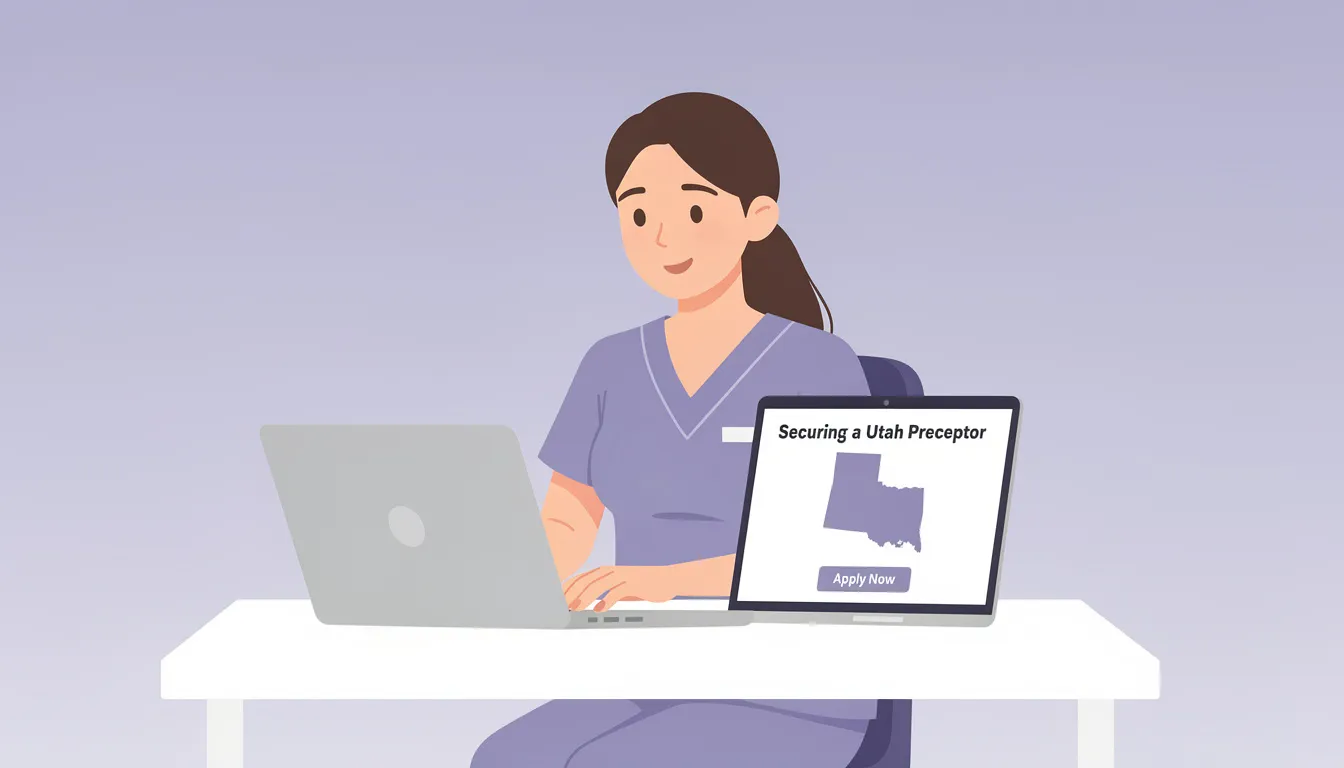Finding a Geriatric NP preceptor has become one of the most challenging steps in nursing education for nurse practitioner students. As the population of older adults continues to grow across the country, the need for advanced practice registered nurses trained in geriatric and adult care has increased dramatically. Yet the number of qualified preceptors available to teach has remained limited.
For many students, this disconnect creates weeks or even months of searching, unanswered emails, and rising stress. Clinical placements are required to complete nursing school, gain hands-on experience, and graduate. Without a clinical site, progress toward professional goals can pause entirely.
This guide explains why it is so hard to find a Geriatric NP preceptor, what challenges are happening behind the scenes, and how NPHub helps nurse practitioner students secure clinical placements near their location with guidance and support from start to finish.
TL;DR: Why Geriatric NP Preceptors Are So Hard to Find
- Demand for Geriatric Nurse Practitioners continues to rise as older adults require more primary care and acute care services
- There is a nationwide shortage of clinical preceptors willing and able to teach
- Nurse practitioner students face competition across nursing programs, healthcare settings, and specialties
- The search process often adds stress while students balance work, coursework, and family life
- Preceptor matching services like NPHub help students secure qualified Geriatric NP preceptors faster and with less administrative burden
👉 Create your free NPHub account to view verified Geriatric NP preceptors and move forward with confidence.
The Growing Struggle for Nurse Practitioner Students to Secure a Geriatric NP Clinical Placement
Across the country, nurse practitioner students enrolled in Adult-Gerontology Primary Care and Acute Care programs face growing difficulty securing clinical placements.
Healthcare systems urgently need providers trained to care for older adults in primary care clinics, long-term care facilities, assisted living centers, hospitals, and community offices. Yet the number of available clinical sites and clinical preceptors has not grown at the same pace.
Students pursuing an MSN degree or Doctor of Nursing Practice (DNP) must complete required clinical hours to remain on track in their program. These placements provide hands-on experience in real clinical practice, allowing students to develop competence, apply evidence-based guidelines, and prepare for future roles in nursing and healthcare.
Many nursing students are also working full-time jobs while completing coursework, managing paperwork, and coordinating communication with clinics and instructors. The effort required to secure a placement often becomes overwhelming.
This is where many students reach out for help. NPHub was created to support nurse practitioner students during this exact moment, providing access to qualified preceptors and removing unnecessary barriers in the placement process.
The Reality of Searching for a Qualified Geriatric NP Preceptor in Nursing School
The challenge facing Geriatric NP students is structural, not personal.
Nursing education programs continue to expand, but the number of advanced practice registered nurses available to teach has not kept up. Many preceptors report burnout, administrative overload, and concerns about productivity metrics when supervising students.
Hospitals, clinics, and long-term care facilities can only accommodate a limited number of students at a time. Competition exists across nursing students, medical students, physicians in training, and other healthcare disciplines.
Even highly motivated students with strong professionalism, willingness to learn, and clear communication skills may struggle to find a clinical site. This shortage affects nursing programs nationwide and has become one of the biggest challenges in nursing education today.
If you are searching and feeling stuck, it is important to remember that this situation reflects system-wide capacity limits, not your dedication or ability.
Why Geriatric NP Preceptors Are in High Demand Across Primary Care and Acute Care Settings
Older adults often require complex care involving multiple medications, chronic conditions, and coordination across specialties. Geriatric Nurse Practitioners play a critical role in managing these needs in both primary care and acute care environments.
However, precepting students requires time, commitment, and additional paperwork. Many experienced nurse practitioners and physicians are focused on patient care, managing stress, and meeting organizational expectations.
Faculty shortages and limited training programs for instructors further reduce the number of available mentors. As a result, nursing students pursuing geriatric specialties face intense competition for a small pool of qualified preceptors across healthcare settings.
For students, this means early planning, focused searching, and using structured services can make a meaningful difference.
But you’re not alone, create your free NPHub account and find a Preceptor in your specialty.
The Emotional Toll of the Geriatric NP Preceptor Search
Searching for a preceptor often becomes emotionally exhausting.
Each unanswered email or delayed response adds pressure. Deadlines approach. Graduation timelines feel uncertain. The weight of managing school, work, life, and clinical requirements at the same time can feel heavy.
This stress does not come from a lack of effort. It comes from navigating a complex system while still showing up as a student, professional, and caregiver in everyday life.
Taking one supported step forward can help restore clarity. That step might be using a service designed specifically to guide students through this process.
You are not meant to navigate this alone. Create your free NPHub account and take the next step with support.
How to Stand Out to Geriatric NP Preceptors During Clinical Practice
Geriatric preceptors notice students who show readiness to learn and commitment to quality care.
Ways to stand out include:
- Showing curiosity about medications, care plans, and treatment decisions
- Preparing by reviewing guidelines and geriatric care principles
- Communicating clearly with patients, preceptors, and healthcare teams
- Adapting to different clinical environments and specialties
- Demonstrating professionalism, compassion, and respect
These skills reflect competence and readiness for advanced practice nursing.
How NPHub Helps Nurse Practitioner Students Secure Geriatric NP Preceptors Faster
NPHub exists to simplify the most challenging part of nursing school.
Instead of searching alone, students gain access to a nationwide network of verified, qualified Geriatric NP preceptors actively teaching in primary care, acute care, and specialty clinics.
NPHub manages:
- Preceptor vetting and credential verification
- Clinical site coordination
- School paperwork and compliance
- Ongoing communication and support
This structured process helps students secure placements efficiently while focusing on education, clinical experience, and professional development.
👉 Create your free NPHub account to explore available Geriatric NP preceptors near your location.
Moving Forward in Your Geriatric NP Journey
Pursuing a nursing career focused on caring for older adults is meaningful, demanding, and deeply impactful. Every step you have taken in your education reflects dedication to quality, compassion, and service.
Finding a preceptor should support that journey, not stall it.
NPHub was built to help nurse practitioner students move forward with confidence, guidance, and real support.
👉 Create your free NPHub account and take the next step toward completing your clinical placements, graduating on time, and building the future you envision.
You’re prepared for this next step, and you don’t have to take it alone.
Frequently Asked Questions About Finding a Geriatric NP Preceptor
1. How long does it usually take to find a Geriatric Nurse Practitioner preceptor?
The timeline varies depending on your location, school deadlines, and available clinical sites. Many students spend several weeks searching on their own. Using a preceptor-matching service like NPHub can help you secure a placement much faster since it connects you directly with verified Adult-Gerontology Primary Care and Acute Care Nurse Practitioners who are already accepting students.
2. What kinds of clinical sites count toward Geriatric NP program requirements?
Approved sites typically include hospitals, primary care clinics, nursing homes, long term care facilities, assisted living facilities, and retirement communities. Some nursing programs also allow students to complete rotations in private practices or specialty practices, as long as the site provides experience in gerontology or adult primary care and meets the program's eligibility requirements.
3. Can I complete my geriatric clinical hours in a primary care setting?
Yes. Many Geriatric Nurse Practitioner and Adult-Gerontology Nurse Practitioner students complete their clinical hours in primary care clinics where they manage chronic conditions, develop care plans, and focus on health promotion and disease prevention for older adults.
4. Why are Geriatric NP preceptors harder to find?
The demand for gerontology education has grown faster than the supply of qualified preceptors. Many advanced practice nurses and acute care nurse practitioners have full workloads and limited time for student supervision. In addition, many nursing schools compete for the same preceptors, creating long wait times for students who need to complete their clinical training.
5. How many clinical hours do Geriatric NP students need to complete?
Most MSN and DNP programs require between 500 and 700 clinical hours, depending on whether the focus is Adult-Gerontology Primary Care or Adult-Gerontology Acute Care. Always confirm your program's educational requirements with your school or American Nurses Credentialing Center (ANCC) guidelines.
6. Can I stay with the same preceptor for multiple rotations?
It depends on your nursing practice program. Some schools allow students to remain with one Geriatric NP preceptor for consecutive rotations, as long as the clinical experiences meet different learning objectives. Always verify with your program coordinator before confirming placements.
7. What if my school requires an affiliation agreement or site contract?
Many schools do. These agreements ensure compliance and liability protection for both the student and the clinical site. NPHub manages these agreements directly with schools and preceptors, helping students avoid delays and unnecessary paperwork.
8. Do NPHub preceptors accept part-time or online students?
Yes. Many NPHub preceptors accommodate students enrolled in part-time or online nursing programs. You can filter available Geriatric NP preceptors by location, schedule, and specialty area to find a placement that aligns with your work setting and academic plan.
9. What if I already have a preceptor but need help with paperwork?
If you've already secured a Geriatric Nurse Practitioner or Adult-Gerontology Nurse Practitioner preceptor, NPHubcan still help. Our team can review your preceptor's credentials, ensure they meet your state licensure and program requirements, and manage school documentation on your behalf.
10. How do I get started with NPHub?
It's simple. Create your free NPHub account, browse verified Geriatric NP preceptors, and view open clinical sites near you. Once you find a match, NPHub will guide you through each step of the placement process — from school approval to final confirmation — so you can stay focused on your education and prepare confidently for your certification exam.
Key Definitions
- Geriatric Nurse Practitioner (GNP):
A nurse practitioner who specializes in the care of older adults and elderly patients. GNPs focus on health promotion, disease prevention, and the management of chronic conditions affecting physical, emotional, and cognitive well-being in older adulthood. - Adult-Gerontology Nurse Practitioner (AGNP):
An advanced practice registered nurse who provides comprehensive primary care or acute care to adults across the lifespan, with a focus on aging populations. AGNPs may work in hospitals, nursing homes, long term care facilities, or private practices. - Preceptor:
An experienced nurse practitioner, physician, or other qualified healthcare provider who supervises and mentors students during clinical training. Preceptors guide students in applying classroom knowledge to real patient care and developing confidence in their nursing practice. - Clinical Placement:
A supervised clinical setting where nurse practitioner students complete required clinical hours to gain hands-on experience. Placements are essential for meeting program eligibility requirements and preparing for certification exams. - Clinical Hours:
The time spent providing direct patient care under the supervision of a preceptor. Most MSN and DNP programs require between 500–700 clinical hours, depending on whether the student focuses on Adult-Gerontology Primary Care or Acute Care. - Affiliation Agreement:
A formal contract between a nursing school and a clinical site that allows students to complete rotations there. These agreements ensure liability coverage, compliance with state licensure rules, and clear communication between the student, school, and site. - Preceptor Matching Services:
Professional services like NPHub that connect nurse practitioner students with verified, qualified preceptors across different specialties. These services handle the logistics — paperwork, site coordination, and communication — helping students find and secure placements faster. - Adult-Gerontology Primary Care (AGPCNP):
A nursing specialty focused on the long-term, holistic management of adult and elderly patients in primary care settings. AGPCNPs emphasize prevention, patient education, and chronic disease management. - Adult-Gerontology Acute Care (AGACNP):
A nursing specialty centered on caring for adults with complex, acute, or critical illnesses in hospital or intensive care environments. AGACNPs often work in acute care units, critical care, or emergency settings.
About the author
- NPHub Staff
At NPHub, we live and breathe clinical placements. Our team is made up of nurse practitioners, clinical coordinators, placement advisors, and former students who’ve been through the process themselves. We work directly with NP students across the country to help them secure high-quality preceptorships and graduate on time with confidence. - Last updated
December 2nd, 2025 - Fact-checked by
NPHub Clinical Placement Experts & Student Support Team - Sources and references
Find a preceptor who cares with NPHub
Book a rotation.webp)








.webp)


.webp)



%20(3)%20(2).svg)
.webp)